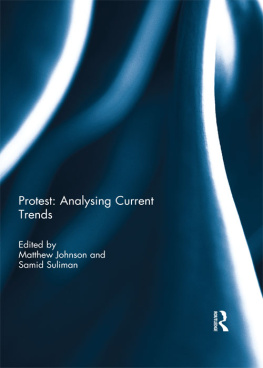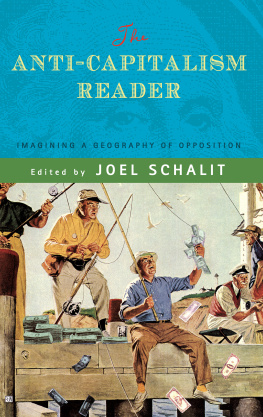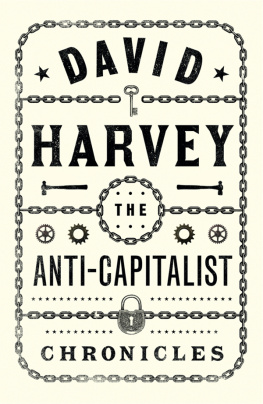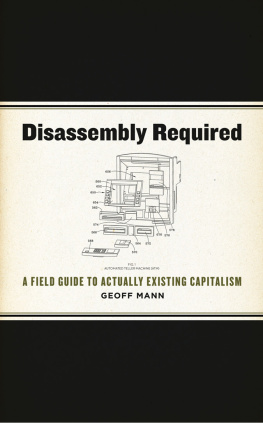Anti-Capitalism
A Beginners Guide
ONEWORLD BEGINNERS GUIDES combine an original, inventive, and engaging approach with expert analysis on subjects ranging from art and history to religion and politics, and everything in between. Innovative and affordable, books in the series are perfect for anyone curious about the way the world works and the big ideas of our time.
aesthetics
africa
american politics
anarchism
animal behaviour
anthropology
anti-capitalism
aquinas
art
artificial intelligence
the bahai faith
the beat generation
the bible
biodiversity
bioterror & biowarfare
the brain
british politics
the Buddha
cancer
censorship
christianity
civil liberties
classical music
climate change
cloning
cold war
conservation
crimes against humanity
criminal psychology
critical thinking
daoism
democracy
descartes
dewey
dyslexia
energy
the enlightenment
engineering
epistemology
european union
evolution
evolutionary psychology
existentialism
fair trade
feminism
forensic science
french literature
french revolution
genetics
global terrorism
hinduism
history of science
homer
humanism
huxley
iran
islamic philosophy
islamic veil
journalism
judaism
lacan
life in the universe
literary theory
machiavelli
mafia & organized crime
magic
marx
medieval philosophy
middle east
modern slavery
NATO
nietzsche
the northern ireland conflict
nutrition
oil
opera
the palestineisraeli conflict
particle physics
paul
philosophy
philosophy of mind
philosophy of religion
philosophy of science
planet earth
postmodernism
psychology
quantum physics
the quran
racism
reductionism
religion
renaissance art
shakespeare
the small arms trade
sufism
the torah
united nations
volcanoes


A Oneworld Book
First published by Oneworld Publications, 2004
Revised edition, 2013
Copyright Simon Tormey 2013
The moral right of Simon Tormey to be identified as the Author of this work has been asserted by him in accordance with the Copyright, Designs and Patents Act 1988
All rights reserved
Copyright under Berne Convention
A CIP record for this title is available from the British Library
ISBN 978-1-78074-250-2
Ebook ISBN 978-1-78074-251-9
Typeset by Cenveo
Printed and bound in Great Britain by
TJ International, Padstow, Cornwall, UK
Oneworld Publications
10 Bloomsbury Street
London WC1B 3SR
England
Stay up to date with the latest books, special offers, and exclusive content from Oneworld with our monthly newsletter
Sign up on our website
www.oneworld-publications.com
Contents
Acknowledgements
I need, firstly, to thank the team at Oneworld for their help and guidance since the inception of this project. It has been a source of surprise, delight and fear to find publishers who took such a close interest in what I was writing. Secondly, Id like to thank the many individuals who chipped in with ideas, read portions of what I was writing or otherwise made my life easier. I should mention in particular Pete Waterman and Graeme Chesters, both of whom came out of the blue with interesting suggestions, papers and bibliographies. Easily my largest debt in this regard is, however, owed to Andy Robinson. As well as supplying a near constant stream of activist materials over the past few years, he has been a valuable sounding-board for more or less every idea or theme that has found its way into the book. He also read and commented in his own inimitable fashion on crucial parts of the manuscript. Finally, Id like to thank Vronique and our children, Max, Gabrielle and Louis for putting up with me and my numerous absences when I should have been reading them a book or playing in the field. This book is dedicated to the original anarcho-situationist-beatnik, my mother, Patricia Tormey, who passed away just before work began on this revised edition. Some are given to write and think about life after capitalism, and some peoples lives embody what that might mean in practice. Patricia was one of those people. She is much missed by her friends and family.
Introduction
Anti-capitalism is not a new phenomenon. Indeed it is as old as capitalism itself, which most experts in the field would date from the rise of European mercantile or trading societies in the seventeenth and eighteenth centuries. On the other hand, popular interest in anti-capitalism, the kind of interest that drives commentators to write books about the topic, is new. It is new because until recently there was nothing that looked like an anti-capitalist movement, something that united all the disparate factions, groupings, ideologies and followers of the left. Anti-capitalism, so it was held, was something that had died with the failed revolts of 1968, or with the Fall of the Berlin Wall or the Death of Communism. Yet, piece by piece, event by event, these conclusions have been shown to be premature.
A number of key events over the course of the past couple of decades have encouraged many to conclude that there is, or might be, a global anti-capitalist movement. They include the Zapatista insurrection of 1994 that inspired numerous meetings and campaigns in solidarity; the Seattle protests of 1999; the creation of the World Social Forum in 2001; the wave of protests by the Indignados and the creation of the worldwide Occupy movement in 2011. Quite apart from these discrete yet always interconnected events and initiatives, there is a more general sense that anti-capitalism is in the air. The Global Financial Crisis (GFC) of 2007 onwards punctured the impression of self-confidence amongst elites. It created uncertainty amongst commentators and experts about the inevitability of capitalism, and thus created a chink of possibility for querying the desirability and necessity of capitalism itself. Figures such as Slavoj iek, a self-proclaimed Marxist and communist, were treated quite seriously by mainstream as well as alternative media. All manner of ideas and alternatives were given air time in a manner that was quite impossible to imagine before 2007. Indeed this author was invited to give a presentation at the 2010 OECD annual assembly on life after capitalism, something that would have been improbable a decade earlier, to say the least. Anti-capitalism has become part of the contemporary political climate. But what is anti-capitalism? What does it mean to be anti-capitalist? And where is anti-capitalism going if anywhere?
As someone who has been teaching a variety of anti-capitalist subjects for two decades I have attempted to keep up with most things anti-capitalist over the course of that time. This was a fairly straightforward task until recently. Before then, anti-capitalism meant looking mostly at the ideas and events of the past, sometimes the far-flung past. It also meant keeping abreast of the various activisms and ways in which apparently unfashionable ideas like socialism, anarchism and Marxism were supposed to be evolving, changing or adapting to New Times. Anti-capitalism was a minority subject, in this case a very minor one compared with the more mainstream interests of some of my colleagues. The Seattle protests of 1999 changed all that. What we have witnessed since then is an enormous outpouring of analyses, commentaries and manifestos to go alongside the huge increase in activist materials, websites, newspapers and periodicals. Looking at the mountain of material out there, what is noticeable is that the work of those committed to saying something or writing about anti-capitalism tends to be of three kinds, some of which may be helpful











